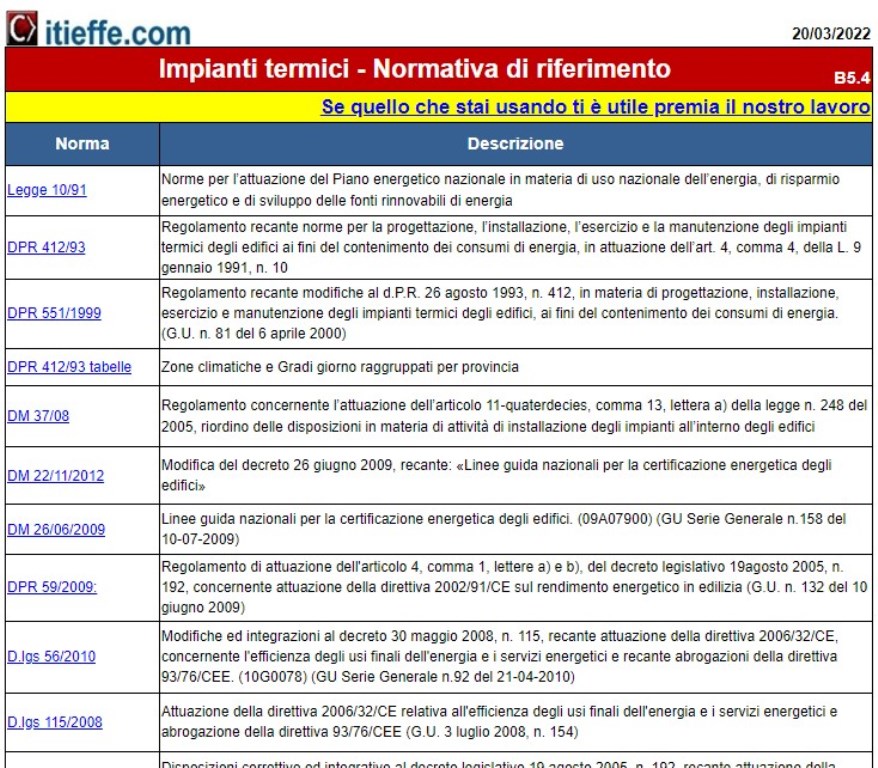Thermal systems - Reference legislation

Operation, control and maintenance of heating systems - Summary and obligations
The reference legislation for heating systems, which concerns their operation, control and maintenance, is a fundamental element to guarantee the safety, efficiency and sustainability of these systems. This legislation was developed to regulate operations related to heating systems in order to protect the environment, ensure user comfort and prevent potentially dangerous accidents or failures.
Legislation regarding heating systems may vary from country to country, but generally includes the following objectives:
- Security: the legislation establishes safety standards that must be respected to avoid accidents such as gas leaks, fires or structural damage.
- Energy efficiency: Laws often require that heating systems be designed and maintained to maximize energy efficiency, thereby reducing energy consumption and environmental impact.
- Indoor air quality: regulations may include requirements relating to air quality inside buildings, ensuring that the air breathed by occupants is healthy.
- Certifications and periodic checks: It is common for legislation to require regular inspections and certification of conformity for heating systems, in order to verify that they are maintained in an adequate state.
- Training and expertise: the legislation may provide training and competence requirements for operators who manage and maintain heating systems.
- Reduction of emissions: some regulations promote the reduction of greenhouse gas emissions and other air pollutants, for example by requiring the use of cleaner technologies or promoting renewable energy sources.
It is essential that owners, operators and workers who manage heating systems are aware of and comply with the relevant legislation applicable to their geographical context. Adherence to these regulations not only promotes safety and efficiency, but also contributes to environmental sustainability and the well-being of building occupants. Therefore, correct implementation of the legislation is crucial to ensure optimal functioning of heating systems.
Thermal systems - Reference legislation
Operation, control and maintenance of heating systems - Summary and obligations
There may be some application differences in the Regions that have issued their own regulations on the subject, therefore it is recommended to consult the relevant regional websites.
The Regions that in 2015 have adopted regional regulatory provisions on heating systems are:
- Abruzzo
- Emilia Romagna
- Liguria
- Lombardia
- Marche
- Piemonte
- Toscana
- Umbria
- Veneto
- Valle d'Aosta
- Sicilia
What is meant by: "Thermal system"
LAW 3 August 2013, n. 90 - art. 2 - l-tricies
technological system intended for winter or summer air conditioning services of the rooms, with or without the production of domestic hot water, regardless of the energy vector used, including any systems for the production, distribution and use of heat as well as the regulation and control bodies. Individual heating systems are included in the thermal systems. Thermal systems are not considered appliances such as: stoves, fireplaces, localized radiant energy heating appliances; these appliances, if fixed, are however assimilated to thermal plants when the sum of the nominal power of the hearth of the appliances serving the single real estate unit is greater than or equal to 5 kW. Systems dedicated exclusively to the production of domestic hot water serving individual residential units and similar are not considered to be thermal plants ".
What is meant by: "Third party responsible"
Decree of the President of the Republic August 26, 1993, n. 412
Art 1. Definitions.
o) for "third party responsible for the operation and maintenance of the heating system", the natural or legal person who, being in possession of the requisites provided for by the regulations in force and in any case of suitable technical, economic, organizational capacity, is delegated by the owner to assume responsibility for the operation, maintenance and adoption of the measures necessary to contain energy consumption.
Other free programs of the same kind offered by itieffe ▼
- Heating - Plumbing
- Pipelines
- Heating tables
- pumps
- Heating drawing diagrams
- Domestic hot water
- Combustible gases
Thermal systems - Reference legislation
The program below is free to use.
To access the reserved version (see below), full page and without advertising, you must be registered.
You can register now by clicking HERE
